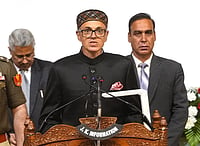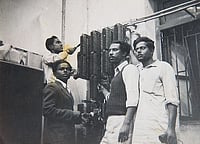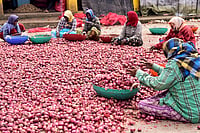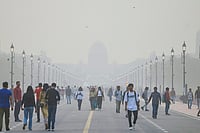Maratha reservation activist Manoj Jarange-Patil has been on a hunger strike since February 10. Amid reports of his deteriorating condition, all eyes are now on the Eknath Shinde-led Shiv Sena-BJP government in Maharashtra. Jarange-Patil has announced that he will end his hunger strike only after a law is enacted to provide Kunbi certificates to the Maratha community, in accordance with the draft notification issued by the state social justice department in January regarding the same.
Maratha Reservation Stir Leaves BJP With A Twin Challenge Ahead of Polls
The BJP needs to find a solution to the reservation question that satisfies both the Maratha and OBC vote banks of Maharashtra in time for the 2024 Lok Sabha elections

Amid protests led by Jarange-Patil in January, Chief Minister Eknath Shinde had announced that Kunbi certificates would be issued to 57 lakh Marathas in the state, given they have records to prove their Kunbi antecedents. Such certificates would also be issued to blood relatives (sage-soyare) of Marathas with Kunbi roots, based on affidavits filed by those with Kunbi certificates or records. On January 27, following the announcement, Jarange-Patil called off his march to Mumbai after the draft notification was issued, but promised to have it legally scrutinised. The activist and his team have demanded some changes in the text of the draft notification.
Comprising about 33 per cent of Maharashtra’s population, the Marathas do not get reservations in education or government jobs and have been demanding the same for decades.
The community managed to get 16 per cent reservation granted by the state government in 2019 following a legal battle. The quota was struck down by the Supreme Court in 2021, calling it “unconstitutional” as it violated the 50 per cent cap on reservations.
This has led to an escalation of protests and sometimes violent agitations by pro-reservation activists across Maharashtra, which may become a problem for the BJP. While Shinde and the BJP have managed to purportedly placate the Marathas, a dominant political community in Maharashtra, any misstep at this point threatens to hurt its core OBC vote bank.
To understand how reservation politics impacts state and national politics, it is key to look at the journey of the demand for a Maratha quota, which has taken many twists and turns since the formation of Maharashtra in 1960.
Why Marathas are demanding Kunbi certificate
In 1961, based on the Kaka Kalelkar report, the Centre gave the discretionary power to states to form their independent commissions to identify socially and educationally backward castes in their states and implement steps to ameliorate these sections. In the same year, the Maharashtra government set up a commission to identify such castes and in 1964, the B D Deshmukh commission gave its report which named 180 castes and sub-castes as backward. This list did not include the Marathas. A clan of Marathas called the Kunbis, however, were part of the list.
The Mandal Commission report, released in 1980 and implemented in 1990, sought 27 per cent reservation for Other Backward Castes in jobs and education. This report also did not consider Marathas a backward caste, naming it as a “forward Hindu caste”.
In 1995, the Maharashtra government set up yet another commission to look into the findings of the Deshmukh panel. The Khatri Commission also failed to list Marathas as a backward caste owing largely to their high representation in electoral politics.
Nevertheless, quota agitations continued in Maharashtra and a formal demand for Maratha reservation was raised in 1997. In response, the Maharashtra government set up another committee to look into the matter. Led by former judge RM Bapat, the committee’s report also did not favour reservations for Marathas as it did not find the community in need of special benefits.
It was only in 2014 that a committee chaired by now BJP minister Narayan Rane submitted a report to state government in which it stated that 32 per cent of the Maharashtrian population is Maratha and in need of economic upliftment, thereby necessitating reservation. Based on the report, then Congress chief minister Prithviraj Chavan accepted a proposal for a 16 per cent reservation for Marathas in government jobs and educational institutions along with a 5 per cent reservation for Muslims. The successive ordinance was challenged before the Bombay High Court which stayed its implementation. The court cited “faulty” data collected by the government as the reason for the stay.
Thus, the nine-member Maharashtra State Backward Class Commission headed by Justice MG Gaikwad was formed and in 2018, it submitted its report to BJP chief minister Devendra Fadnavis. This commission declared the Marathas as the socially and educationally backward class of citizens (SEBCs). The Fadnavis government quickly acted on the report and in 2018, passed the Maharashtra State Reservation for Socially and Educationally Backward Classes (SEBC) Act.
The Act, which provided 16 per cent reservations to Marathas but omitted the 5 per cent reservations for Muslims, was challenged in Bombay High court and in 2019, the court upheld the backward status of the Marathas. However, it ordered the reduction of the quota from 16 to 12 per cent. The decision was challenged in Supreme Court which struck down the quota in 2021, calling it unconstitutional.
Why has reservation for Marathas been dubbed ‘unconstitutional’?
Even a 12 per cent quota for Marathas raised the reservation ceiling in education and jobs to 64 per cent and 65 per cent, respectively. This violates the 50 per cent cap on reservations set by the SC which ruled in 1992 that reservations could not exceed 50 per cent. As per the verdict, anything above that would violate equal access as guaranteed by the Constitution. In its 2019 judgment, the Bombay High Court had said that the 50 per cent cap set by SC in the Indra Sawhney (Mandal) judgment of 1992 could be breached in exceptional circumstances. However, the 2021 verdict by SC found no adequate “special circumstances” to justify raising the ceiling. It rejected the Gaikwad commission’s findings as well.
The Shinde government is pursuing a curative petition on the quota question in the SC. It has granted permission for the setting up of another commission to check the status of the backwardness of the Maratha community.
The politics of Maratha reservation: Rise of Manoj Jarange-Patil
The quota agitations gained ground in September 2023 when a little-known activist from Marathwada’s Beed - Manoj Jarange-Patil, was lathi-charged by the police, thereby becoming the face of the movement. Since then, under his leadership, the agitation has focused on getting Marathas under the Kunbi category, which has OBC status and thereby is beneficiary of 27 per cent reservations.
He initially had demanded Kunbi certificates for Marathas in the Marathwada region, based on the fact that the Nizam rulers in Hyderabad state (of which Marathwada was initially a part till 1960) had accepted Kunbis as Marathas. Later, the activist expanded his demand, seeking Kunbi caste certificates for Marathas pan-India in a bid to include more Marathas to the OBC basked of castes.
Striking a balance: BJP and the OBC question
By agreeing to meet Jarange-Patil’s demand to issue caste certificates to Marathas who can prove Kunbi descent or lineage, Eknath Shinde has averted a major crisis that could have brought Mumbai, the business capital of India, to a standstill. Maratha reservation agitation has always been an emotional issue in the state and led by activists who have chosen death over defeat.
In 1980, ex-Congress leader Annasaheb Patel raised a demand for a standalone Maratha quota on the grounds of economic backwardness. In 1982, he threatened to die by suicide for his cause. When the Congress government in the state failed to address his demands, he killed himself with his firearm on March 22. Over 50 Maratha youth have ended their lives in protest for Maratha reservation since then.
With such a backdrop, Jarange-Patil’s fast unto death had rightly left the Maharashtra government concerned. For the BJP, the agitation spelled trouble. Through December and January, pro-reservation protesters took an increasingly anti-BJP stance for its failure to respond to the quota demand. Jarange had initially set December 24 as the deadline for the Shinde government to announce the quota, threatening an indefinite hunger strike at Azad Maidan in south Mumbai in case of failure to comply.
The government set a February timeline for a new quota bill, leading Jarange to start his march and hunger strike on January 20. He claimed that over one crore protesters would reach Mumbai on January 24. The protests, which had the potential to bring Mumbai to a standstill, had to be handled with care.
By striking an agreement with Jarange about allowing more Marathas to be counted as Kunbis, Shinde thwarted a potential security hassle in the city while also placated the dominant Maratha committee of which he is a part. However, the move to include Marathas under OBC has not been met with welcome by the overall OBC community, which also is one of BJP’s key vote banks. Tensions with the BJP are likely to impact the BJP’s performance in the upcoming 2024 general elections as well as the state’s politics.
While Marathas comprise about 33 per cent of the state’s population, OBCs make up around 52 per cent and have traditionally voted for the BJP. The Marathas, who purportedly trace their lineage from Kshatriya kings like Shivaji, have traditionally voted for Congress-NCP. The Marathas have also been the dominant political class of the state, with 12 out of 20 Maharashtra chief ministers being Maratha. Considered to be a “caste-cluster” tracing descent from mixed lineages (Kshatriya kings, agrarian class) the Marathas had initially rejected the “backward” tag. The Mandal Commission and 27 per cent reservation for OBCs nevertheless challenged the dominant political position of Marathas in the state. The community’s economic and social status has also suffered due to changes in land holdings and agrarian distress over the years, leading to an increasing gap between privileged and deprived Marathas, many of whom have flocked to the BJP.
Even as Jarange-Patil continues his protest, OBC groups and activists have reacted sharply to the inclusion of Marathas in the OBC category, with the community unwilling to share its slice of reservation pie with people who have enjoyed traditionally dominant positions in society. OBC activists have stated that the draft ordinance undermines the OBC quota and have threatened protests across the state.
Twin Challenge for BJP
Amid the ongoing crisis in Maharashtra, the Congress and other opposition parties are also vying for the large chunk of OBC votes ahead of the Lok Sabha polls. While OBCs are seen as a BJP bastion, Rahul Gandhi’s recent promise to remove 50 per cent reservation cap may help the party gain popularity among the OBC. Raising the reservation ceiling has long been a demand by OBC and other communities as it increases the size of the basket of castes eligible for reservations. Community leaders like OBC Jan Morcha president Prakash Shendge, and Maharashtra OBC Mahasangh president Babanrao Taywade have rejected the draft ordinance.
At present, the BJP faces a twin challenge in Maharashtra - managing its allies, the rebel factions of Shiv Sena and the Ajit Pawar-led Nationalist Congress Party (NCP), while maintaining the status quo with OBCs, the party’s core and most voluminous voter base nationally. By agreeing to Jarange-Patil's key demand, Shinde may have won the hearts of Marathas but the decision has not gone down well, reportedly, with BJP leadership. NCP minister Chhagan Bhujbal, an influential voice in OBC politics who has consistently opposed the inclusion of Marathas in the OBC category has told the media that the draft is not yet final.
Last year during the winter session of legislature in Nagpur, CM Shinde announced a special session in February 2024 to discuss and resolve all matters related to the Maratha reservation issue. The government has also sought suggestions and objections on the draft notification till February 16.
Meanwhile, the Marathas led by the rebellious Jarange-Patil, remain unassured. While the activist has been fasting for nearly a week, this time the response of the BJP-NCP government has been lukewarm. No leaders have come to meet him yet. The activist has been quoted by media as questioning the government’s delay in implementation of the notification and issuance of Kunbi certificates to 57 lakh Marathas. “What are they waiting for?” He has asked. Members of Marathi groups like Maratha Kranti Morcha have also expressed their objections and displeasure with the Shinde government. “There is a feeling of being cheated,” the group’s state coordinator Sanjay Lakhe-Patil, has been quoted by media as saying.
- Previous Story
 Bypolls In Kerala: Tough Time For Left, Hope For BJP and Yet Another VIP Candidate For Congress
Bypolls In Kerala: Tough Time For Left, Hope For BJP and Yet Another VIP Candidate For Congress - Next Story




















